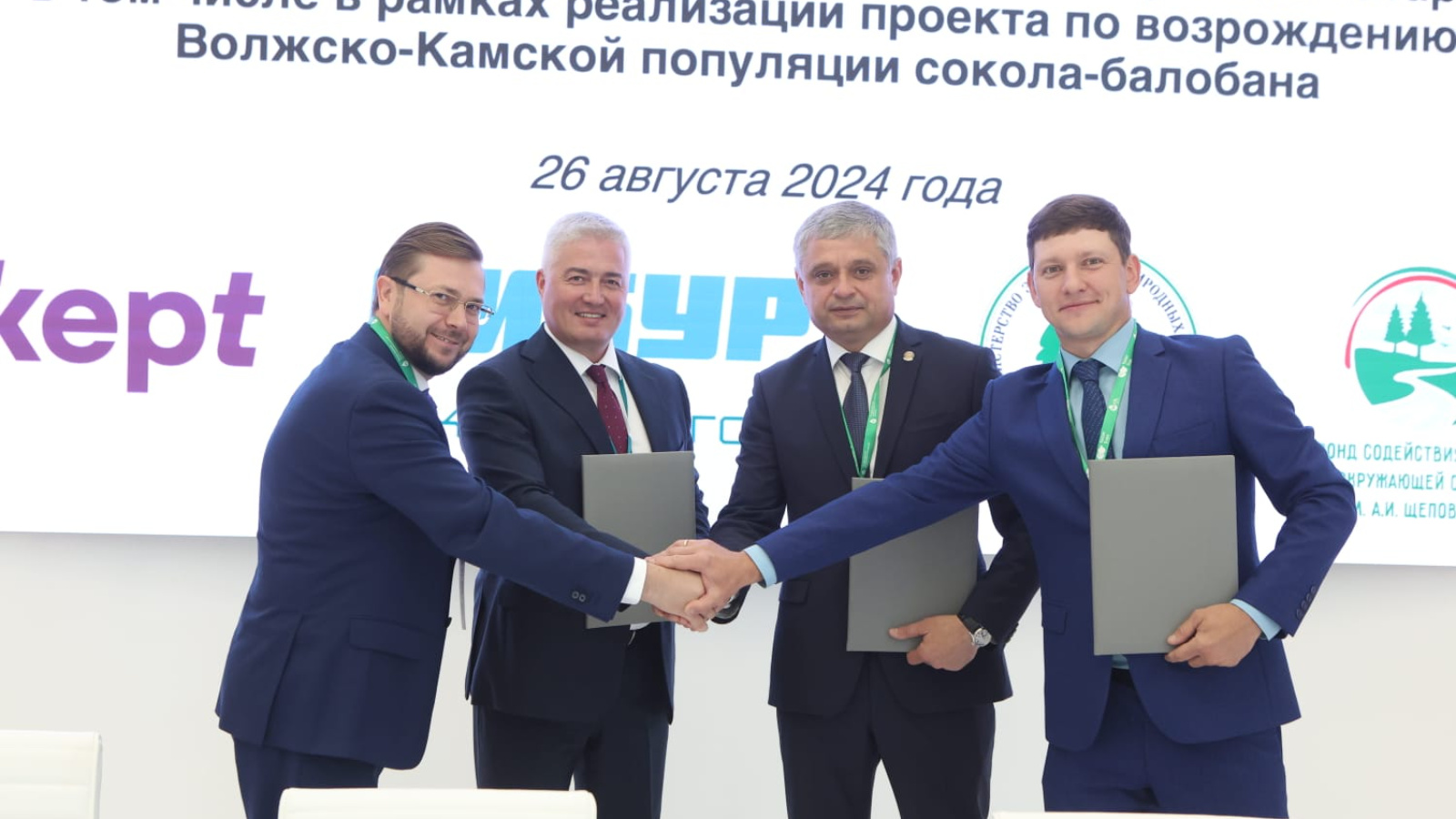In support of the Ecology project, the Ministry of Ecology of Tatarstan and SIBUR will continue to implement a project to revive the Volga-Kama Saker falcon population

Today, within the framework of the Tatarstan Petrochemical Forum in Kazan, an Agreement on cooperation and interaction was signed between the Ministry of Ecology of the Republic of Tatarstan, PJSC Kazanorgsintez, the A.I. Shchepovskikh Regional Public Fund for Environmental Protection and Capt Taxes and Consulting LLC.
The document was signed by Alexander Shadrikov, Minister of Ecology and Natural Resources of the Republic of Tatarstan, Airat Safin, General Director of Kazanorgsintez PJSC, and Executive Director of the Shchepovskikh A.I. Regional Public Foundation Andrey Agarkov and Igor Korotetsky, Director of Capt Taxes and Consulting LLC.
The document confirms the intention of the parties to work together on the implementation of tasks related to the conservation of biological diversity in the republic, in particular, on a project to restore the population of the saker falcon in the Republic of Tatarstan.
The Saker falcon is a rare bird species listed in the Red Books of the International Union for Conservation of Nature, the Russian Federation and the Republic of Tatarstan. SIBUR has been providing grant support to the project for the revival of the Volga-Kama Saker falcon population for two years as part of its social investment program "Formula of Good Deeds".
The signed agreement provides for assistance in the implementation of the activities of the Federal Project "Conservation of Biological Diversity and development of ecological tourism" of the national project "Ecology", support for the restoration of the bird population in the Republic, as well as activities to inform and educate the public about the importance of preserving rare species of animals. The Capt company will provide methodological and advisory support to the project.
The first successes of the program can already be noted: The first falcons raised within the framework of the project began to successfully inhabit the natural territories of Tatarstan. Let us recall that in June 2023, 10 saker falcon chicks were delivered to the Kamsko-Ustinsky district of the Republic of Tatarstan and released into the wild. In 2024, the project of the Ministry of Ecology of the Republic of Tatarstan to revive the Volga-Kama Saker falcon population with the support of the SIBUR grant system was continued, at the end of June 6 saker falcon chicks were delivered to the Kamsko-Ustinsky district, where they were under the protection of ornithologists and volunteers, and later released into the wild. All the falcons started to fly, began to hunt independently and explore new territories. The novelty of this year was that the specialists of the Kazan Zoo took part in the release of birds, monitored their condition, and 4 adult birds were placed in the aviaries of the Kazan Zoo for the formation of pairs and breeding of chicks in the Republic of Tatarstan.
In August of this year, the red book falcon found its visual reflection on one of the industrial installations of the enterprise. On the torch of a closed polycarbonate factory, the artists depicted an adult saker falcon that takes off from a birch branch. The implemented art project has an educational task to attract public attention to the issue of restoring the biological diversity of the region.
"Supporting the Saker falcon restoration program is an important step towards preserving the biological diversity of our republic. We are glad that together with SIBUR, the Shchepovsky Foundation and scientists, we can contribute to the revival of this rare species in the wild of Tatarstan," said Alexander Shadrikov, Minister of Ecology and Natural Resources of the Republic of Tatarstan.
Airat Safin, General Director of Kazanorgsintez: "The Saker falcon reintroduction project is not only a contribution to nature conservation, but also a symbol of our company's responsible approach to environmental issues. The signed agreement is an important step towards the restoration of the Volga-Kama population of this rare bird."